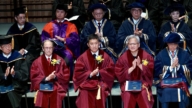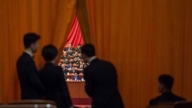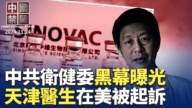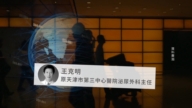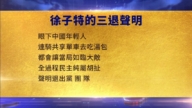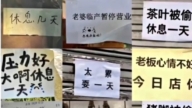【新唐人2013年01月09日訊】「中國社會科學院社會學研究所」7號發佈了《社會心態藍皮書》,其中調查顯示,中國社會的總體信任指標,在2012年進一步下降,已經跌破及格線。報告還指出,中國社會出現了所謂「反向情緒」。學者對此表示,這一切都是當局一手造成的。
藍皮書認為,中國目前的社會只有不到一半的人認為,社會上大多數人可信,只有二到三成信任陌生人。群體間的不信任也在加深和固化,不僅表現為官民、警民、醫患、民商等社會關係的不信任,還表現在不同階層、群體之間的不信任,從而導致社會衝突增加。越來越多相同利益、身份、價值觀念的人們採取群體形式表達訴求、爭取權益,群體間的摩擦和衝突增加。
藍皮書指出,幼童遭輾路人視而不見的「小悅悅事件」,以及「南京彭宇案」引發老人跌倒要不要扶的討論,甚至劉翔奧運會摔倒後的質疑,還有,對擊斃連續殺人犯周克華是否真實等的疑問,都成為社會信任惡化的註腳。
獨立評論員邢天行:「法律的不公在中國是最嚴重的,它不止是不公,甚至它是走在作惡的前列,配合政府的官員在作惡,這就導致整個社會的紊亂。老百姓被侵權,他沒地方去訴求,更沒有人為他主持公道,所以它導致政府應該解決的問題,變成了人和人之間這種完全不信任。」
獨立評論員邢天行表示,社會的不公、政府不作為是社會信任度下降的根本原因,其中法律的不公,起到了很壞的作用。
另外,上海的楊佳襲警案、鄧玉嬌案、鳳凰少女跳樓案、湖南永州朱軍槍擊法官案、黑龍江伊春刺死信訪幹部案等,都明顯表達了部分民眾對於司法部門的不滿。
而藍皮書對北京、廣東、江蘇、浙江和四川5個省市的農民工調查後發現,64%的調查對像感覺到社會不公平,47%的調查對像表示自己外出打工期間受到的不公平對待「比較多」。約60%的農民工會採取「不幹了或忍氣吞聲」等消極逃避的方法來應對不公,約14%的人會選擇正規維權途徑,約15%的人選擇恐嚇事主等非正規途徑,還有約9%的人會採取破壞性的洩憤方式。
藍皮書指出,不斷發生的社會性事件,導致社會情緒的耐受性和控制點降低,社會事件的引爆點降低。弱勢群體中一些本該同情的卻欣喜、本該憤恨的卻欽佩、本該譴責的卻讚美,藍皮書警告說,這些「社會情緒反向」值得警惕。
事實上,社會情緒反向由來已久。
2008年7月孤身闖入上海公安閘北分局的楊佳,殺6位、傷4位警察,受到廣大民眾讚賞,甚至被譽為大俠稱號。
山東大學退休教授孫文廣:「公開的媒體經常報導一些虛假的東西,對真相極力掩蓋,特別對中共當局的醜行盡量掩蓋,像《南方週末》、《炎黃春秋》都受打壓。群眾衝突增加,還有反向的情緒,這個都是當局一手造成的。」
「山東大學」退休教授孫文廣還指出,目前,民眾的不滿無處申訴,甚至還遭到打壓,民間正義的聲音也不能被聽到,而媒體則充斥與事實相反的謊言。孫文廣認為,這只會進一步增加民眾不滿情緒。
藍皮書課題組也承認,近年來民眾不滿情緒主要存在三個指向:一是對於貪污腐敗、不作為的官員,二是「為富不仁」的商人,三是針對一些不公平的社會現象,以及造成這些不公平的公共權力機關。
孫文廣表示,《南方週末》新年獻辭遭到「篡改」引發的事件,當局的繼續高壓,只會讓中共失掉民心和增加民眾的不滿。他指出,如果中共當局不順應潮流繼續打壓,中東獨裁者的結局就是中共的前車之鑒。
採訪/田淨 編輯/宋風 後製/鍾元
Blue Book: China Social Trust Below the Baseline
On Jan. 7, Chinese Academy of Social Sciences released
“Blue Book of Social Mentality.”
The report shows that the overall social trust has declined
in 2012, dropping below the baseline.
The report said that in the Chinese society had emerged
the so-called “reverse mood.”
According to scholars,
the authorities are the leading cause of it.
The report states, less than 50% of Chinese people think
they can trust most people, and 20-30% can trust strangers.
Distrust among various groups had also worsened.
This manifests between the public and officials, civilians
and police, patients and doctors, citizens and businessmen.
It can be seen between different classes and groups too,
which causes social conflicts to intensify.
Similar interests’ groups protect their needs together,
they struggle for gain, thus the conflicts are increasing.
The report mentions the cases of ‘little Yueyue hit by a van
and left unassisted’ and ‘the case of Peng Yu from Nanjing,’ making people question whether to help elderly on the street.
Plus, the suspicion over Olympic athlete Liu Xiang’s fall,
and the police killing the murderer Zhou Kehua, with these incidents becoming strong examples of social distrust.
Xing Tianxing (Current Affairs Commentator):
“This is the most serious issue of law injustice.
It is not only injustice, but the leading cause of crime.
It encourages government officials to commit crimes, which brings disorder to society.
People’s rights are violated; there is no place to appeal,
no justice.
This is not being solved by the government,
and it leads to distrust amongst people.”
Xing Tianxing, an independent commentator said, inequality
in society and irresponsible government are the fundamental cause of social distrust.
The injustice of law makes things even worse.
Many cases manifest people’s anger
towards the unjust system.
Like Shangai’s Yang Jia killing cops’ incident;
the Deng Yujiao’s stabbing an official in self-defense’ case;
Zhu Jun from Yongzhou, Hunan Province, who killed three
judicial workers; a petitioner stabbing to death a cadre from an appeal office in Yichun, Heilongjiang Province, etc.
The report said, for the survey they selected migrant workers
in Beijing, Guangdong, Jiangshu, Zhejiang and Sichuan.
Of them, 64% think there is inequality in the society,
47% felt they were treated unfair at work most of the time.
Almost 60% responded that they deal with unfairness
by leaving, or by bearing it quietly.
About 14% of them prefer to appeal, 15% – to threaten
their superiors, and 9% would choose to revenge.
The Blue Book points out, social events continue to occur,
leading to reducing the control over the society’s sentiments, and bringing the tipping point of incidents closer.
Instead of gaining sympathy, some cases win people’s
cheering, and others get admirations instead of criticism.
Thus, the report calls this a “reverse mood,”
and warns to alert about its social danger.
Actually, this “reverse mood” of the society
exists for a while now.
On July, 2008, Yang Jia went in a Shanghai’ police station,
killed 6 cops, and injured 4 others; he was praised and called ‘hero’ by the public.
Sun Wenguang (retired Professor, Shangdong University):
“China’ media often report false news, covering up the truth.
Especially when it comes to covering up the scandals
of the Chinese Communist Party (CCP).
For example, the Southern Weekly newspaper,
and the Yanhuang Chunqiu magazine are both suppressed.
In addition, increasing of protests and the ‘reverse mood,’
are also caused by the government.”
Sun Wenguang pointed out that now people don’t have
place to appeal, and are being beaten instead.
Civil injustice can’t be heard, media lie too, thus Sun thinks
these problems would escalate further the public discontent.
The Blue Book team admitted that there are three aspects
of public discontent.
They are, the corrupt and irresponsible officials; the corrupt
businesspeople; and authorities that cause social inequality.
Sun said, the Southern Weekly’s New Year address was
a censored incident, which authority continue to suppress.
With such actions they can only lose people’s trust,
and increase public discontent.
Sun added that if the CCP continues with its suppression,
the Middle East dictators’ fate should be a lesson for CCP.


